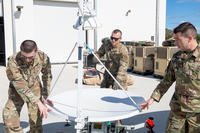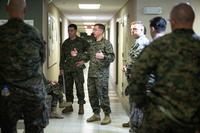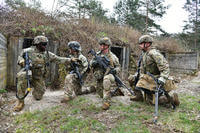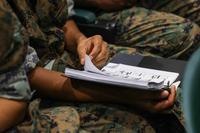The Obama administration’s Nuclear Posture Review (NPR) was released today (which can be found here) and Secretary of Defense Robert Gates, Secretary of State Hillary Clinton, Secretary of Energy Steven Chu and Chairman of the Joint Chiefs of Staff Navy Adm. Mike Mullen held a brief press briefing at the Pentagon to discuss the NPR.
The fundamental role of nuclear weapons is to deter nuclear armed states, Gates said and that the U.S. will not threaten to use nuclear weapons against any non-nuclear states that are party to the Non-Proliferation Treaty. He said the administration didn’t believe it was far enough along in getting control of nuclear proliferation around the world to limit U.S. options. When it comes to North Korea and Iran, Gates said “all options are on the table,” if they don’t agree to “play by the rules.”
“This is obviously a weapon of last resort,” he said. The U.S. will continue to hold accountable any state or non-state actor that proliferates weapons of mass destruction. The NPR states that chemical or biological weapons use by any country against U.S. forces will be met by a “devastating” conventional response.
Gates also said that the U.S. will not develop any new nuclear warheads but will extend the life of existing warheads. Refurbishment of weapons is favored over replacement; any replacement will require presidential approval. DOE secretary Chu said his agency’s life extension programs can maintain the "effectiveness" of the nuclear stockpile without testing.
Gates said a number of command and control issues were “tightened up” to give the president more time to make any decision regarding nuclear weapons use. Nuclear armed bombers were no longer sitting ready on runways and all ICBMs were targeted at open ocean in the case of an inadvertent launch.
He said the issue of tactical nuclear weapons forward deployed in Europe is a NATO issue that will be evaluated within NATO by consensus.
Key NPR conclusions:
• The United States will continue to strengthen conventional capabilities and reduce the role of nuclear weapons in deterring non-nuclear attacks, with the objective of making deterrence of nuclear attack on the United States or our allies and partners the sole purpose of U.S. nuclear weapons.
• The United States would only consider the use of nuclear weapons in extreme circumstances to defend the vital interests of the United States or its allies and partners.
• The United States will not use or threaten to use nuclear weapons against non-nuclear weapons states that are party to the NPT and in compliance with their nuclear non-proliferation obligations.
Also, it states, “the United States will not use or threaten to use nuclear weapons against non-nuclear weapons states that are party to the NPT and in compliance with their nuclear non-proliferation obligations.”
There is a prominent caveat though: “Any state eligible for the assurance that uses chemical or biological weapons against the United States or its allies and partners would face the prospect of a devastating conventional military response.”
The Nuclear Triad of ICBMs, SLBMs and nuclear capable heavy bombers will be maintained.
The NPR says the U.S. will keep tactical nukes forward deployed in Europe, on tactical fighters and heavy bombers and will proceed with the “full scope life extension” for the B-61 bomb. The Tomahawk nuclear-tipped sea-launched cruise missile (TLAM-N) will be retired.
All ICBMs will be “de-MIRVed” to a single warhead each to increase stability.
Also, the military will continue “the practice of “open-ocean targeting” of all ICBMs and SLBMs so that, in the highly unlikely event of an unauthorized or accidental launch, the missile would land in the open ocean, and asking Russia to re-confirm its commitment to this practice.”








